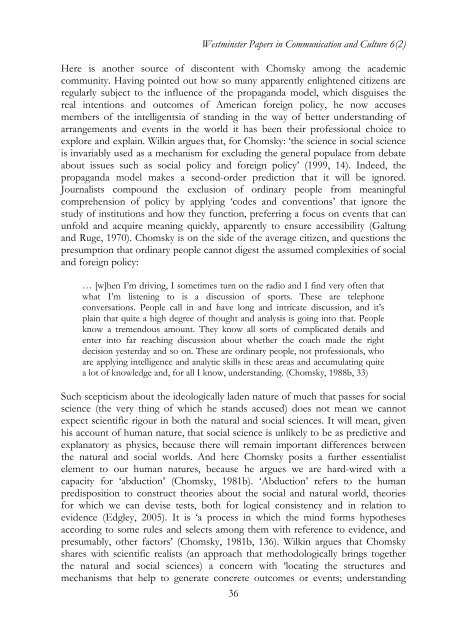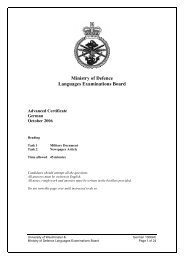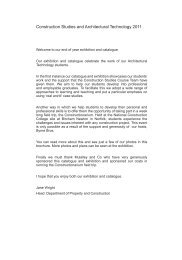Social Science, Rhetoric and Chomsky's Critique - Alison Edgley
Social Science, Rhetoric and Chomsky's Critique - Alison Edgley
Social Science, Rhetoric and Chomsky's Critique - Alison Edgley
Create successful ePaper yourself
Turn your PDF publications into a flip-book with our unique Google optimized e-Paper software.
Westminster Papers in Communication <strong>and</strong> Culture 6(2)Here is another source of discontent with Chomsky among the academiccommunity. Having pointed out how so many apparently enlightened citizens areregularly subject to the influence of the propag<strong>and</strong>a model, which disguises thereal intentions <strong>and</strong> outcomes of American foreign policy, he now accusesmembers of the intelligentsia of st<strong>and</strong>ing in the way of better underst<strong>and</strong>ing ofarrangements <strong>and</strong> events in the world it has been their professional choice toexplore <strong>and</strong> explain. Wilkin argues that, for Chomsky: ‘the science in social scienceis invariably used as a mechanism for excluding the general populace from debateabout issues such as social policy <strong>and</strong> foreign policy’ (1999, 14). Indeed, thepropag<strong>and</strong>a model makes a second-order prediction that it will be ignored.Journalists compound the exclusion of ordinary people from meaningfulcomprehension of policy by applying ‘codes <strong>and</strong> conventions’ that ignore thestudy of institutions <strong>and</strong> how they function, preferring a focus on events that canunfold <strong>and</strong> acquire meaning quickly, apparently to ensure accessibility (Galtung<strong>and</strong> Ruge, 1970). Chomsky is on the side of the average citizen, <strong>and</strong> questions thepresumption that ordinary people cannot digest the assumed complexities of social<strong>and</strong> foreign policy:… [w]hen I’m driving, I sometimes turn on the radio <strong>and</strong> I find very often thatwhat I’m listening to is a discussion of sports. These are telephoneconversations. People call in <strong>and</strong> have long <strong>and</strong> intricate discussion, <strong>and</strong> it’splain that quite a high degree of thought <strong>and</strong> analysis is going into that. Peopleknow a tremendous amount. They know all sorts of complicated details <strong>and</strong>enter into far reaching discussion about whether the coach made the rightdecision yesterday <strong>and</strong> so on. These are ordinary people, not professionals, whoare applying intelligence <strong>and</strong> analytic skills in these areas <strong>and</strong> accumulating quitea lot of knowledge <strong>and</strong>, for all I know, underst<strong>and</strong>ing. (Chomsky, 1988b, 33)Such scepticism about the ideologically laden nature of much that passes for socialscience (the very thing of which he st<strong>and</strong>s accused) does not mean we cannotexpect scientific rigour in both the natural <strong>and</strong> social sciences. It will mean, givenhis account of human nature, that social science is unlikely to be as predictive <strong>and</strong>explanatory as physics, because there will remain important differences betweenthe natural <strong>and</strong> social worlds. And here Chomsky posits a further essentialistelement to our human natures, because he argues we are hard-wired with acapacity for ‘abduction’ (Chomsky, 1981b). ‘Abduction’ refers to the humanpredisposition to construct theories about the social <strong>and</strong> natural world, theoriesfor which we can devise tests, both for logical consistency <strong>and</strong> in relation toevidence (<strong>Edgley</strong>, 2005). It is ‘a process in which the mind forms hypothesesaccording to some rules <strong>and</strong> selects among them with reference to evidence, <strong>and</strong>presumably, other factors’ (Chomsky, 1981b, 136). Wilkin argues that Chomskyshares with scientific realists (an approach that methodologically brings togetherthe natural <strong>and</strong> social sciences) a concern with ‘locating the structures <strong>and</strong>mechanisms that help to generate concrete outcomes or events; underst<strong>and</strong>ing36
















